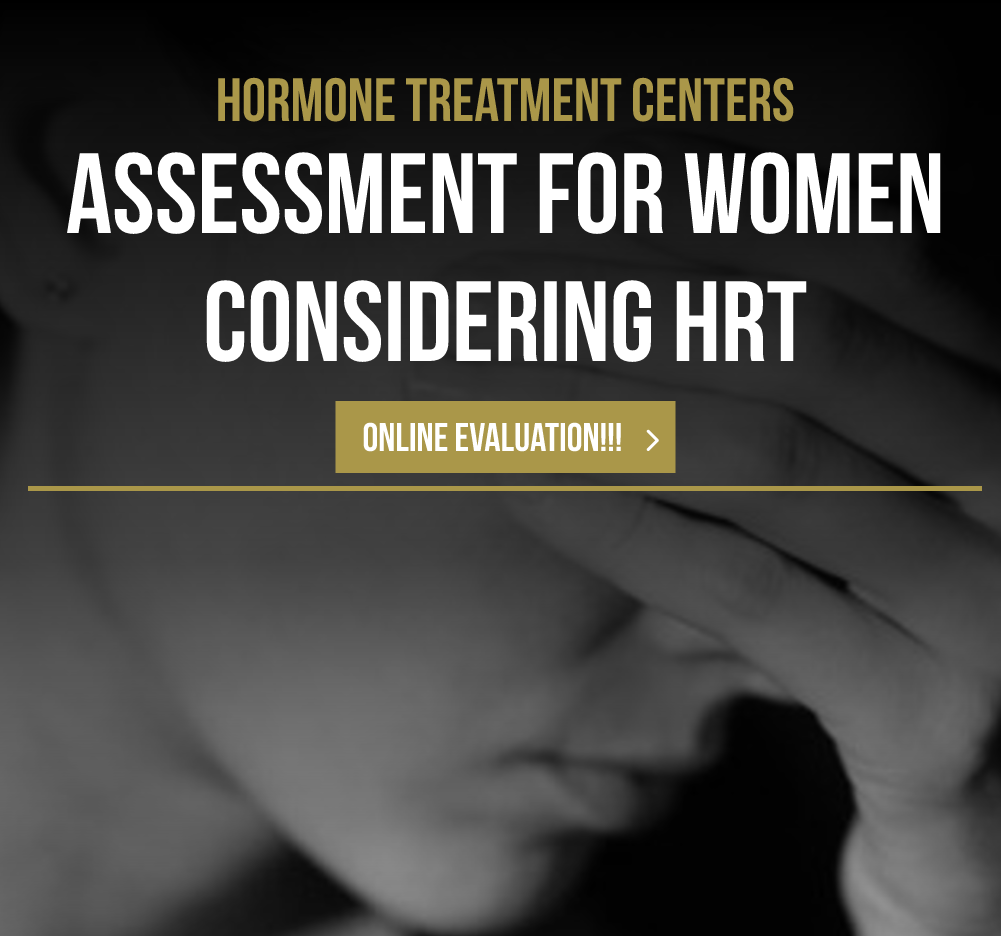Available TreatmentsAvailable Treatments
Learn More: Women and HRT
Hormone Treatment Centers: Clinic Introduction

Are you looking for a solution to alleviate the symptoms of perimenopause and menopause? Our hormone treatment centers offer effective relief through Bioidentical Hormone Replacement Therapy (BHRT). Explore how our comprehensive approach can help you regain hormonal balance and improve your well-being.
Early perimenopause refers to the stage before menopause when a woman’s menstrual periods become irregular. It usually occurs in the 40s but can start in the late 30s as well. During this phase, hormonal changes take place in the body, leading to various symptoms.
Common symptoms of early perimenopause include irregular periods, changes in the flow of menstrual blood (either heavier or lighter), hot flashes, night sweats, mood swings, reduced fertility, dryness in the vagina, sleep disturbances, and changes in sexual desire. It’s important to remember that every woman’s experience is different, and some may not have noticeable symptoms during this time.
It’s also worth noting that early perimenopause doesn’t necessarily mean that menopause will occur earlier than usual. Menopause typically happens around the age of 51, but it can vary. Menopause is confirmed when a woman has gone 12 consecutive months without a period.
During menopause, hormonal fluctuations stabilize at lower levels, and the body adjusts to the absence of menstrual cycles. Menopausal symptoms, such as hot flashes, may persist but usually become less intense over time. It’s also important to take care of your bone density and cardiovascular health during this stage by maintaining a healthy lifestyle, including regular exercise and a balanced diet.
Menopause is a natural physiological phase that signifies the conclusion of a woman’s reproductive years. It signifies the permanent cessation of menstruation, indicating that a woman no longer experiences menstrual periods. Typically occurring between the ages of 45 and 55, with an average age of around 51, menopause can commence earlier or later based on factors such as genetics, health conditions, and lifestyle choices.
During menopause, the ovaries gradually decrease the production of estrogen and progesterone, the hormones responsible for regulating the menstrual cycle and supporting fertility. As hormone levels fluctuate and decline, women may encounter a variety of symptoms that can vary in intensity and duration. These symptoms may include hot flashes, night sweats, vaginal dryness, mood swings, sleep disturbances, changes in sexual desire, and irregular periods leading up to the final menstrual period.
The transition phase leading up to menopause, known as perimenopause, can persist for several years. It is during this period that menstrual cycles may become irregular, and symptoms of hormonal changes may manifest. Once a woman has experienced 12 consecutive months without a menstrual period, she is considered to have reached menopause.
It is important to recognize that menopause is a natural aspect of the aging process and is not classified as a medical condition. However, if menopausal symptoms significantly impact a woman’s quality of life, there are various treatments and lifestyle modifications that can help manage these symptoms and promote overall well-being. Seeking guidance from a healthcare professional is advisable to discuss individual experiences and explore suitable options.
Hormone treatment can effectively address a wide range of symptoms that are associated with hormonal imbalances. One of the most common symptoms is hot flashes and night sweats, which can cause sudden and intense feelings of heat and excessive sweating. Mood swings and irritability are also frequently experienced, leading to emotional instability and changes in behavior. Sleep disturbances, such as insomnia or disrupted sleep patterns, can significantly impact a person’s quality of life.
Hormone treatment can help regulate these symptoms and promote better sleep. Additionally, hormone therapy can alleviate vaginal dryness and discomfort during intercourse, enhancing sexual well-being and intimacy. Other symptoms that can be addressed include loss of libido or sexual desire, fatigue, memory lapses, difficulty concentrating, weight gain, joint and muscle pain, bone loss, skin changes, and hair thinning or loss. By restoring hormonal balance, hormone treatment can improve overall quality of life and well-being for individuals experiencing these symptoms.
Menopause is a natural biological process that marks the end of a woman’s menstrual cycles. It typically occurs between the ages of 45 and 55, with the average age being around 51. Menopause is diagnosed when a woman has gone without a menstrual period for 12 consecutive months.
Perimenopause refers to the transitional period leading up to menopause. It can begin several years before menopause and is characterized by hormonal fluctuations and changes in the menstrual cycle. During perimenopause, women may experience a range of symptoms, some of which are similar to those experienced during menopause. Here are common symptoms associated with both perimenopause and menopause:
Unlike synthetic hormones, bioidentical hormones closely resemble the ones naturally produced by your body. They offer a more natural and personalized approach to hormone replacement therapy. Learn about the benefits of BHRT and why it may be the right choice for you.
Our customized hormone treatments aim to promote longevity and vitality by addressing the underlying causes of menopause-related symptoms. Discover how our Hormone Replacement Therapy can enhance muscle strength, improve sleep quality, increase energy levels, uplift mood, boost cognitive function, and enhance overall performance.
Explore the specific benefits of our Hormone Treatment program:
Don’t let perimenopause and menopause symptoms hinder your enjoyment of life. Our hormone replacement therapy can provide the relief you need to feel like yourself again. Contact our hormone treatment centers today to start your journey towards improved well-being.
https://my.clevelandclinic.org/health/articles/22464-hormones
“By submitting this form, you expressly consent and agree to be added to our email list. You acknowledge and understand that by opting to provide your email address you are granting the Hormone Treatment Centers, the irrevocable right to communicate with you via email. You also grant permission to send you information regarding company updates, promotions, news, or other relevant content. Your participation is voluntary, and you have the choice to unsubscribe from our email list at any time through the unsubscribe link provided in our communications.